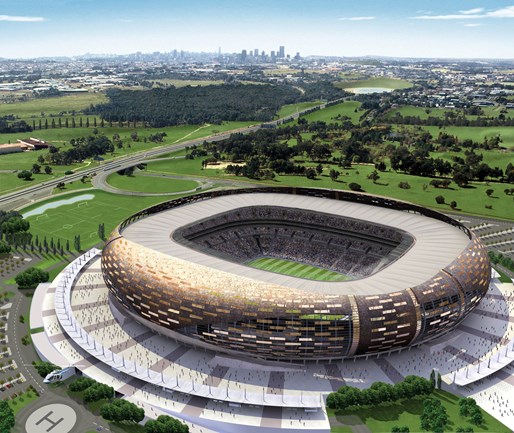SA goes green for World Cup, or does it?

Arial view of the Johannesburg Soccer City Stadium, host of the opening and closing matches of the 2010 FIFA World Cup. Photo: City of Johannesburg
17.03.2010
By Miko SchneiderWith an estimated 2.8 mio. tonnes of carbon emissions, the 2010 World Cup organisers will have a difficult task trying to offset their carbon footprint. Not only has the country invested in the building of stadia and physical infrastructure, but carbon is also emitted through energy use in accommodation, intercity transport, as well as the international transportation of teams and fans from around the world to the host nation. South Africa currently generates most of its electricity from coal, and its transportation systems are mostly petroleum and diesel based.
According to the Feasibility Study for a Carbon Neutral 2010 FIFA World Cup, offsetting the domestic carbon footprint of the 2010 World Cup could cost between €5.0 and 8.8 million, and this does not include offsetting international flights, which alone would be double this amount.
The Climate Neutral Network, an initiative of the UN Environment Programme (UNEP), and the Global Environment Facility (GEF) are assisting the South African government with financial assistance for their carbon offset initiatives. According to the Network, “The 2010 FIFA Soccer World Cup™ offers South Africa a unique opportunity to demonstrate to the world its commitment to responsible environmental management, whilst improving the living environment and livelihoods of South Africa’s people.”
In 2009, Deputy Environment Minister, Rejoice Mabudafhasi, and Chief Executive of the 2010 World Cup organising committee, Danny Jordaan, launched their ‘green programme’ for the World Cup. It includes planting trees to offset the tournament’s carbon footprint; setting up separate trash cans for recycling; installing waterless urinals; using biodegradable containers for food sold at the games; and educating South Africans to be climate conscious.
Municipalities are also supporting green energy projects in the hope that it will boost local industries at the same time. Durban and Pretoria, two major cities, will use biogas from landfill sites, and Cape Town is buying wind energy from the Darling Wind Farm to light up Table Mountain and other city attractions. The Cape Town City Council hopes to use 10% green energy by the time the tournament begins, and it will also sell "Green Electricity Certificates" (1kWh of electricity is equal to one certificate) to FIFA and other public bidders at a premium.
Acclaimed South African environmentalist and journalist Leonie Joubert is sceptical about whether these measures will have the desired outcome. For example, In an article for Virgin Money magazine (South African edition) she writes about the tree planting initiative: “Working out exactly how many trees we’ll need to plant to offset 2.8 million tons of carbon emissions is tricky. We need to know what tree we’re talking about (different trees capture different amounts of carbon) and how long it’s going to stand (it may need to be alive for 40 years to absorb enough carbon to make a difference, but if it dies after 5 years, it’s work isn’t done).”
Only time will tell whether the 2010 ‘green programme’ lives up to its promises for South African citizens, as well as the expectations of international community.
-
Makgabo Seema,
South Africa,
18.06.2010 09:47:
I have been at a couple of fan parks throughout the country and was pleased to see that we are taking recycling seriously. At least we are doing something as a starting point
-
joe .,
18.03.2010 08:48:
You left out a rather important word after the 2.8....it's 2.8 MILLION tonnes, not 2.8! And they haven't made much effort to offset it yet, and aren't likely to. No doubt hope that after the WC everyone'll forget about their green claims.





